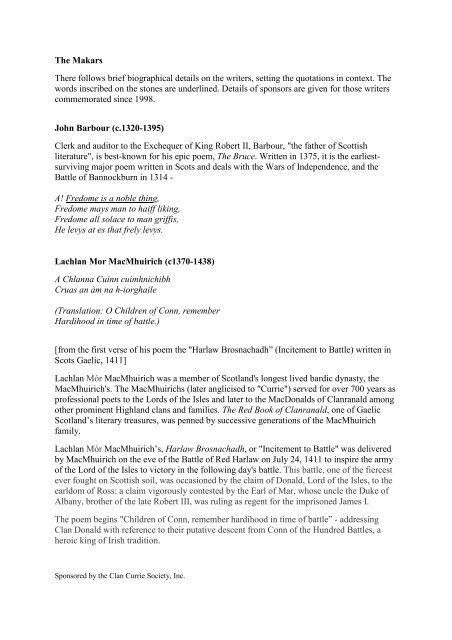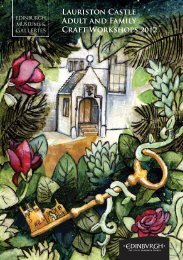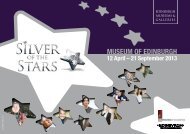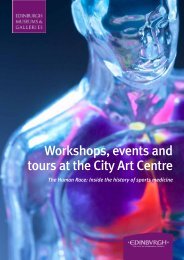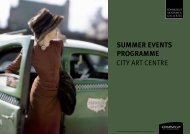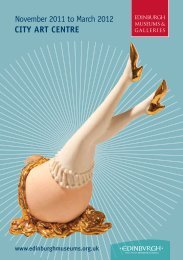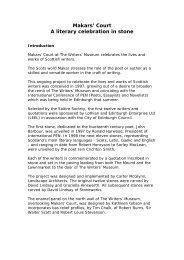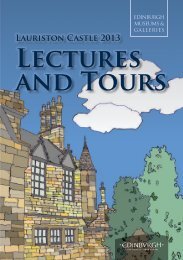More on Makars' Court - Edinburgh Museums
More on Makars' Court - Edinburgh Museums
More on Makars' Court - Edinburgh Museums
You also want an ePaper? Increase the reach of your titles
YUMPU automatically turns print PDFs into web optimized ePapers that Google loves.
The Makars<br />
There follows brief biographical details <strong>on</strong> the writers, setting the quotati<strong>on</strong>s in c<strong>on</strong>text. The<br />
words inscribed <strong>on</strong> the st<strong>on</strong>es are underlined. Details of sp<strong>on</strong>sors are given for those writers<br />
commemorated since 1998.<br />
John Barbour (c.1320-1395)<br />
Clerk and auditor to the Exchequer of King Robert II, Barbour, "the father of Scottish<br />
literature", is best-known for his epic poem, The Bruce. Written in 1375, it is the earliestsurviving<br />
major poem written in Scots and deals with the Wars of Independence, and the<br />
Battle of Bannockburn in 1314 -<br />
A! Fredome is a noble thing,<br />
Fredome mays man to haiff liking,<br />
Fredome all solace to man griffis,<br />
He levys at es that frely levys.<br />
Lachlan Mor MacMhuirich (c1370-1438)<br />
A Chlanna Cuinn cuimhnichibh<br />
Cruas an àm na h-iorghaile<br />
(Translati<strong>on</strong>: O Children of C<strong>on</strong>n, remember<br />
Hardihood in time of battle.)<br />
[from the first verse of his poem the "Harlaw Brosnachadh” (Incitement to Battle) written in<br />
Scots Gaelic, 1411]<br />
Lachlan Mór MacMhuirich was a member of Scotland's l<strong>on</strong>gest lived bardic dynasty, the<br />
MacMhuirich's. The MacMhuirichs (later anglicised to "Currie") served for over 700 years as<br />
professi<strong>on</strong>al poets to the Lords of the Isles and later to the MacD<strong>on</strong>alds of Clanranald am<strong>on</strong>g<br />
other prominent Highland clans and families. The Red Book of Clanranald, <strong>on</strong>e of Gaelic<br />
Scotland’s literary treasures, was penned by successive generati<strong>on</strong>s of the MacMhuirich<br />
family.<br />
Lachlan Mór MacMhuirich’s, Harlaw Brosnachadh, or "Incitement to Battle" was delivered<br />
by MacMhuirich <strong>on</strong> the eve of the Battle of Red Harlaw <strong>on</strong> July 24, 1411 to inspire the army<br />
of the Lord of the Isles to victory in the following day's battle. This battle, <strong>on</strong>e of the fiercest<br />
ever fought <strong>on</strong> Scottish soil, was occasi<strong>on</strong>ed by the claim of D<strong>on</strong>ald, Lord of the Isles, to the<br />
earldom of Ross: a claim vigorously c<strong>on</strong>tested by the Earl of Mar, whose uncle the Duke of<br />
Albany, brother of the late Robert III, was ruling as regent for the impris<strong>on</strong>ed James I.<br />
The poem begins "Children of C<strong>on</strong>n, remember hardihood in time of battle” - addressing<br />
Clan D<strong>on</strong>ald with reference to their putative descent from C<strong>on</strong>n of the Hundred Battles, a<br />
heroic king of Irish traditi<strong>on</strong>.<br />
Sp<strong>on</strong>sored by the Clan Currie Society, Inc.


